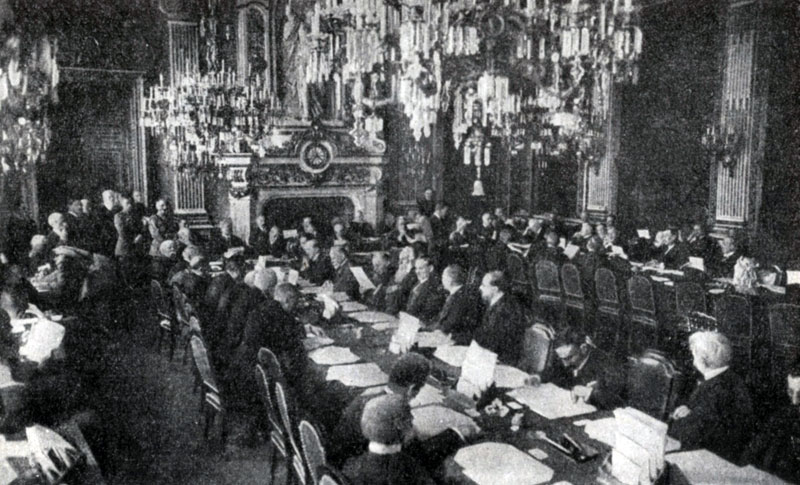Azerbaijan Democratic Republic: first steps in int'l arena

By Nazrin Gadimova
Azerbaijan Democratic Republic, the first secular democratic state of the Islamic world, which was established on May 28, 1918, was significant in Azerbaijan's history, and though it existed for only 23 months, ADR's government reached major progress in foreign policy and introduced Azerbaijan to the international community.
The fate of the Azerbaijan Democratic Republic was up not only to the will of its people, but also the world's leading powers.
After centuries of Russian domination, ADR was established as a result of great ordeals, but the historical conditions in the country posed a threat of new aggression from the Soviet Bolsheviks. Since the very beginning ADR's leaders realized the seriousness of the situation and were doing everything in their power to familiarize the international community with the problems facing the newly created republic.
It was 1918 - the year of global commotion, when World War I ended, and disintegration of the Russian, Austro-Hungarian and Ottoman Empires was in process; new independent states appeared, and the political map of the world was redrawn.
The Paris Peace Conference, which concluded World War I, opened on January 18, 1919, when a delegation of Azerbaijan was still in Istanbul. After long and exhausting correspondence with representatives of the Triple Entente, an Azerbaijani delegation headed off to Paris on April 22, where they arrived only on May 7.
The delegation of the Azerbaijan Democratic Republic, which was sent to Paris under the decision of Parliament, was the first diplomatic mission tasked to express the will of the nation, its quest for independence.
When the government of Azerbaijan was addressing domestic problems, diplomats waged a fierce battle for gaining recognition and support from the victorious powers. At the Paris Peace Conference the Azerbaijani delegation was represented by A.Topchubashov as Chairman, M.G.Gadzhinsky as Vice Chairman; members of the delegation included A.A.Sheykhulislamov, A. Agayev and advisers M.Magerramov and J. Gadzhibekov.
On May 28, 1919 the Azerbaijani delegation was able to meet US President Woodrow Wilson. At this meeting, he said that the issue of Azerbaijan will be decided after the issue on Russia. President Wilson was given a copy of the memorandum which was presented at the Paris Peace Conference. The document consisted of 3 clauses: a memorandum on the independence of the Caucasian Azerbaijan with a description of its boundaries on a special sheet with a map; a memorandum on the economic and financial condition of Azerbaijan with an economic map; a memorandum on the ethnic composition of Azerbaijan with diagrams and an ethnographic map.
On August 19, 1919 the Anglo-Iranian treaty was signed, and Iran relinquished territorial claims against Azerbaijan. On November 1, 1919 Iran recognized Azerbaijan's independence and established diplomatic relations with Baku, which was great success of Azerbaijani diplomacy.
On January 15, 1920 representatives of Azerbaijan and Georgia were invited to the Ministry of Foreign Affairs of France, where they were hosted by the first secretary of the Ministry Jules Cambon, a representative of Great Britain, Philip Kerr, and Marquis de la Torreta, an Italian representative. A formal decision of the Paris Peace Conference was submitted there on de-facto recognition of Azerbaijan by the members of the Supreme Council and allied countries.
Afterwards, a number of countries, including Belgium, Switzerland, Holland, the Czech Republic, Slovakia, and Finland, began to open their consulates in Baku, while Italy opened its diplomatic mission in the city.
It is noteworthy that the Azerbaijani delegation in Paris led the fight for independence not only of ADR but for the whole Caucasus, for its political and moral unity. But unfortunately, the Armenian side, just like nowadays, adhered to a destructive position as regards the Caucasian solidarity issue that prevented sensible progress towards reaching that goal.
Here we are to serve you with news right now. It does not cost much, but worth your attention.
Choose to support open, independent, quality journalism and subscribe on a monthly basis.
By subscribing to our online newspaper, you can have full digital access to all news, analysis, and much more.
You can also follow AzerNEWS on Twitter @AzerNewsAz or Facebook @AzerNewsNewspaper
Thank you!
